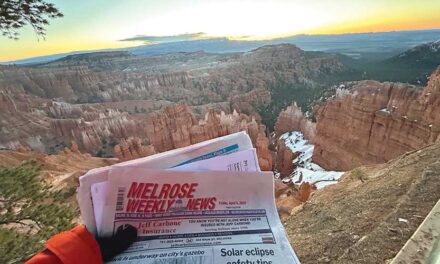Published March 15, 2019
MELROSE — The painting of a bleak landscape without money raised through an override of Proposition 2 1/2 continued this week before the School Committee, as members heard that freshman sports would be eliminated, three junior varsity coaching posts would be axed, software and technology spending would be slashed 20 percent, and both the middle school and the high school’s Learning Commons would close for the day once the final bell sounded, among other things.
As educators continue to roll our their budget plans for the coming academic year — one with the passage of a Prop. 2 1/2 override and the other without — some very tough decisions become clear.
Tuesday night, it was time to go over the impact on athletics, co-curricular programs and instructional materials and supplies.
Voters head to the polls April 2 to decide whether to override Propositon 2 1/2 to raise $5.18 million more in local property taxes each year to help the city meet its needs.
Without this extra money, all freshman sports would be cut. This, according to a presentation made this week, reduces “the opportunities for freshmen to participate in high school athletic programs” and eliminates “the feeder program to Junior Varsity and Varsity Programs.”
The reduction of three JV coaches essentially creates a limit of one assistant coach per sport and “will limit the number of students participating in select sports.”
The budget for athletic transportation will be cut because freshman sports will be eliminated.
In the areas of music and drama, no override will mean the number of drama/musical productions will be reduced to two per grade, and the Youth Band and Youth Orchestra will be eliminated. Administrators said this will (d)erail our efforts to build a robust and first-class music program that has produced many outstanding young musicians.”
Spending on curriculum materials will be cut by 20 percent, or $13,566, without the override money, educators said, which will create the “(i)nability to fund new curriculum mandates (in social studies and science), meet current curriculum needs or to purchase additional items for our growing student population.”
If the override vote fails, technology and software throughout the district would also be cut by 20 percent ($55,335) and would not allow the schools to “fund current needs with respect to software, technology and maintenance of equipment. Additionally,” educators said, “it will prohibit us from adequately servicing the additional students in the upcoming school year” and would present “challenges to scheduling the online MCAS test.”
Also, without an override of Prop. 2 1/2, supplies and materials for subjects like art would be affected.
Professional development for educators would be cut by 10 percent, impacting “our ability to develop the curriculum needed for the new Social Studies curriculum or to continue the development of K-5 science units.”
Closing the middle school and the Learning Commons at the high school would “impact students who need a place to study and gather after school while waiting for extracurricular activities or who are seeking help.”
Outside printing costs would be eliminated, which mean things like graduation programs would be created in-house.
Without money from an override of Prop. 2 1/2, a planned visit from the New England Association of Schools and Colleges would not be funded. Local educators feel they “are taking a risk with our ability to host a visiting team in accordance with NEASC expectations.”
With money from an override, the school system will be able to adequately deal with the continued increase in student enrollment by hiring teachers, administrators, paraprofessionals and support personnel. More money will also mean school building space issues can be addressed. And talented, better-compensated staff will be retained “to meet the academic and social emotional skills, challenges and interests of an increasingly diverse student population.”
A successful override of Prop. 2 1/2 would add four elementary school teachers, two elementary specialists, one assistant elementary school principal, two elementary social workers, restore four middle school staff, add four staff to the high school, two department chairs, a high school guidance counselor, seven paraprofessionals and 1.5 English as a Second Language teaching posts.
On April 9, a public hearing will be held on the fiscal year 2020 education budget.




